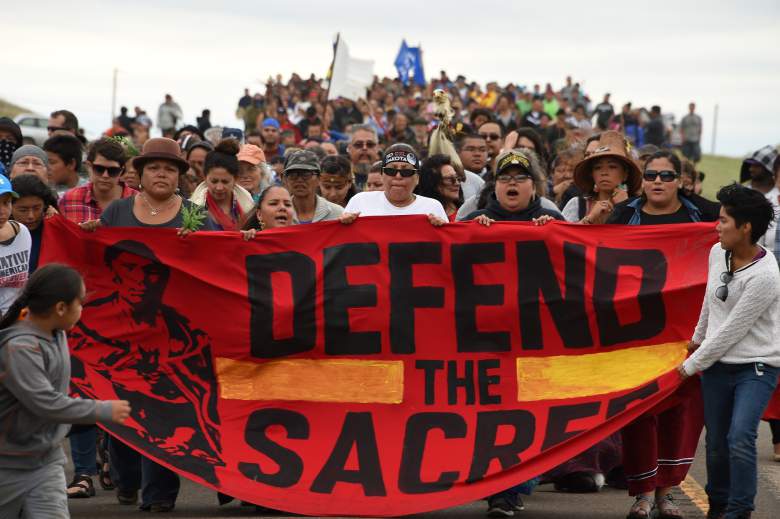Image from Heavy
The Lakota Sioux people have won a momentous victory in North Dakota. After six months of a hard-fought struggle against the Dakota Access Pipeline, the Army Corps of Engineers declared it would not grant a permit to drill through their land. It is no exaggeration to say that this marks the largest environmental victory in the U.S. in decades.
Refusing to bow to big oil and its backers in Washington, the “water protectors” of Standing Rock, as the Sioux activists are known, bravely fought back against the pipeline’s construction through their primary water source, their historical burial grounds and other sacred sites. As a result, they faced violent repression by police. Protesters were fired upon with rubber bullets, sprayed with water cannons in freezing cold temperatures, attacked by dogs, tasered and beaten. More than 600 people were arrested over the course of the struggle, many of whom were locked in dog kennels in a deliberate act of humiliation. Still they persevered.
As a result, the cause of the Lakota Sioux people has become internationally known. Over the past months, thousands of protesters from across the U.S. and the world have travelled to North Dakota in support of the water protectors, living alongside them in temporary encampments. Just this past week, 2,000 veterans made their way to Standing Rock in a show of solidarity. Over 100 musicians and artists signed a petition demanding Obama cancel the pipeline’s construction and take action to end police repression of the Lakota Sioux people and their fellow demonstrators.
The decision by the Army Corps of Engineers to back down on its plans to build through Standing Rock is a testimony to the courage of the Lakota Sioux and the importance of building widespread solidarity for struggles of oppressed communities everywhere. The impact of this victory will surely be felt far beyond North Dakota.
The significance of their victory
The Dakota Access pipeline will stretch over 1,100 miles, from North Dakota’s oil fields to refineries in Illinois. The project is backed by Energy Transfer Partners, an oil and gas company with over $3 billion in gross income. Earlier this year, the Army Corps of Engineers, which is overseeing construction, announced plans to reroute the pipeline through Native land at Standing Rock.
The Lakota Sioux people refused to accept this plan, given the real danger an oil pipeline would pose to their water supply. And not only their own water supply. By planning to construct under the Missouri River, Energy Transfer Partners would be putting in jeopardy the water of millions of Americans.
In addition to the threats to clean water, the DAPL project, which will carry an estimated 470,000 barrels of oil per day, and other new pipelines like it are likely to have a significant impact on global warming. In an open letter published in September, close to 100 climate scientists warned of the long-term dangers posed by the pipeline and related drilling projects, as well as the difficulties the U.S. would face in meeting the commitments of the Paris Agreements while continuing to pursue new oil extraction.
Energy Transfer Partners and other supporters of the pipeline assure us that the strictest safety standards are being followed in the construction of the pipeline. However, oil spills are far more common than the oil industry would have us believe. According to a 2013 report by the Associated press, there were over 300 oil spills in a two-year span just in the state of North Dakota. Incredibly, not one of these spills was ever officially reported.
What’s next
The people of Standing Rock are staying vigilant. There is a real possibility that incoming President Trump will reverse the decision by the Army Corps of Engineers and allow construction of the pipeline through Native lands to resume. When that happens, they are prepared to take up the fight once again for their water and their wellbeing.
Even if Trump does not continue drilling through Standing Rock, we can expect that the new route will run through other poor and marginalized communities. Invariably, it is these communities that are hit hardest by environmental disasters. The most destructive oil spills in the past few years, those in the Gulf of Mexico and in Arkansas, only confirm this.
However, while the pipeline will continue to be built along a new route, it will do so with greatly reduced public support. A recent poll showed that 51 percent of Iowans now think that not enough study was done on the pipeline prior to construction. The pipeline will run through 18 Iowa counties.
Toward a new environmental movement
The victory of the water protectors of Standing Rock offers an example to people involved in struggles across the country. Through perseverance and widespread solidarity, a community of just over 8,000 people has dealt a blow to one of the largest gas and oil companies in the world. The Dakota Access Pipeline project was supported by leaders of both the Republican and Democratic parties, Wall Street and the big banks. But the determination of the people of Standing Rock overcame all of these opponents.
The success of their struggle comes just a year after the Keystone XL pipeline project was defeated through massive demonstrations, which, like Standing Rock, forced Obama to rescind his earlier support.
Workers too have shown their support for the nascent environmental movement. Several individual unions and locals have spoken out in defence of the water protectors of Standing Rock. However, the bureaucracy at the head of the AFL-CIO and other major unions like LiUNA have steadfastly supported the Dakota Access Pipeline and the oil industry. Members of the AFL-CIO must call on the federation to stand with Native people, not the capitalists who say that jobs can only be created at the cost of environmental destruction.
Solidarity among oppressed people like the Lakota Sioux of Standing Rock, workers, and environmental activists can be the basis for a new and powerful environmental movement.











